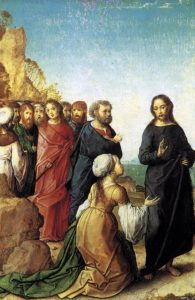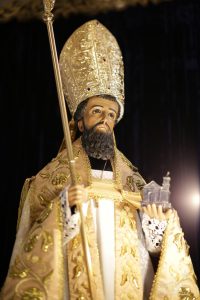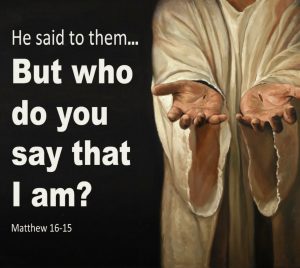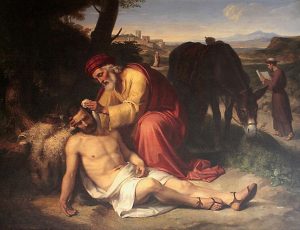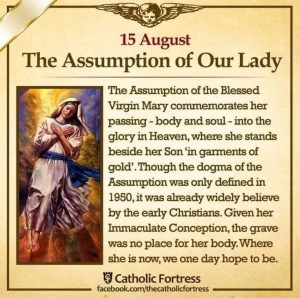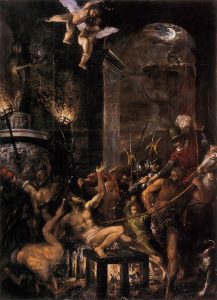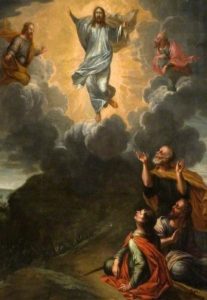For the past few days, I engaged in a discussion with the Seventh Day Adventists with regards to their claim that they are better than Catholics because they honor and keep the Sabbath Day which is Saturday to follow God’s commandments rather than violating it and to change it to Sunday. I kindly pinpointed to them that Christ came to fulfill the law and not to abolish it. When Jesus came, he establishes the new covenant. On the day that He died, the curtain of the temple was torn into two to signify the breaking of the old customs and giving way to the new horizon which raises Jesus for the redeemed. (Matt. 27:51) The tearing of this curtain is an indication of losing Jerusalem Temple as the center of worship. Jesus declared that the house of God was forsaken (Luke 13:33) for Jesus himself is the new temple with no curtain barring us from intimacy with Him. In Addition, the torn curtain reveals that all believers have anew and unequaled access to the Father in Christ. Furthermore, He has risen from the dead on the first day of the week which is Sunday. Our profound understanding about Jesus’ real purpose of coming into this world is to rejoice about the new covenant established by God, in Him, through Him and with Him.
Meditating on the first reading taken from the Prophet Isaiah, this passage describes a God who invites us to a relationship open to all peoples who sincerely seeks and accepts that “my house shall be called a house of prayer for all peoples.” God’s love and salvation generously promised by God for all people of all time which I am reminded of the Holy Father, Pope Francis message to the youth all over the world during the recently concluded WYD 2023, in Lisbon, Portugal. The Pope says, “There is no abstract love. Love is concrete. It’s tangible. It requires us to get our hands dirty.” Furthermore, he says, “On the boat of the Church, there has to be room for everyone: all the baptized are called on board to lower their nets, becoming personally involved in the preaching of the gospel…when dialogue, co-responsibility and participation are lacking the Church grows old.” Thus, the love and mercy of God is encompassing and not exclusive, all of us together, as Church. God calls each one by name.
Likewise, in the second reading, St. Paul’s passionately preached that “For God delivered all to disobedience, that He might have mercy upon all.” It means that God’s mercy is intended for all, whether Jew or Gentile.
The message of God’s love and mercy is for all to know that we are welcome and embrace by God, however, we don’t want to fall into temptation making judgment upon others. Yes, salvation is for all but there is judgment that awaits all of us.
I am mentioning this because some extreme groups are quick to criticize the Church’s stance on inclusivity, however, walking together, and not to fall into discrimination, is the new process that the Church has been called to Synodality which means to pursue a greater Communion, Participation and Mission.
The gospel today from Matthew narrates to us about Jesus’ gesture of love towards the Canaanite woman who calls out to Him, “Have pity on me, Lord, Son of David! My daughter is tormented by a demon.” But Jesus seemingly ignored her for not saying a word in answer to her.
Perhaps, we do not comprehend what is in the heart of the Lord. Let us spend time to contemplate the attitude of Jesus towards the Canaanite woman.
First, with courage, the Canaanite woman went and kneeled before Jesus and said, “Lord, help me.” Jesus told her, “It is not right to take the children’s bread and throw it to the dogs” (Matthew 15:26). She answered Jesus, “even the dogs get to eat the crumbs that fall from their masters’ table.” Jesus was surprised to her response, Jesus exclaimed, “O woman, great is your faith! Be it done for you as you desire.’ And her daughter was healed instantly” (Matthew 15:28).
In our display of faith, it can move Jesus’ heart to act in our favor. Sometimes we give up our faith easily, but we must be consistent even in times of great trial. We need to be firmed with absolute trust in God who knows what is best for us.
Second, Jesus’ response, that He was sent only to the lost sheep of Israel (Matthew 15:24), it means that Jesus was to minister to the Jews first, consequently, their faith would be a witness to the Gentiles, and they would then glorify God for how He fulfilled His promises (Isaiah 53:6-8; Romans 15:8-9).
Third, why did Jesus compare the Canaanite Woman to a Dog? Calling someone a “Dog” is not derogatory name-calling, but it means a metaphor for “Gentiles.” Since the Jews used this word to refer to people under the ceremonial impurity for not being counted as “Chosen People of God. So most of His disciples were Jews, hearing Him calling the woman a dog, I presumed that they approved it unanimously. They understood that she was an outsider.
In many instances, Jesus’ mission is calling all men to Himself, including the Gentiles. Pharisees, scribes, Jewish religious leaders, the Samaritans, Levites, and Canaanites whom He considered as the Israel’s lost sheep. Jesus has to fulfill prophecy to bring them back to God by preaching and holy examples. Jesus, as Messiah, is the One whom the Old Testament prophesied would gather the lost sheep (Ezekiel 34:23-24; Micah 5:4-5). He must fulfill His ministry by preaching to the Jews was His priority.
Can we learn anything from the Canaanite Woman’s Story? Let us reflect on Canaanite woman’s attitude of being frank yet humble, persistent but patient, and courageous to approach Jesus with much faith. We can all do the same and encourage others to do so as well.
God bless you.
Fr. Arlon, osa
——————————-
El Dictado del Corazón: Vigésimo Domingo del Tiempo Ordinario, año A
- Isaías 56:1, 6-7
- Salmo 67:2-3, 5, 6+8
- Romanos 11:13-15, 29-32
- Mateo 15:21-28
Durante los últimos días, participé en una discusión con los Adventistas del Séptimo Día sobre su afirmación de que son mejores que los católicos, porque honran y guardan el día de reposo, que es el sábado para seguir los mandamientos de Dios en lugar de violarlo y cambiarlo al domingo. . Amablemente les señalé que Cristo vino a cumplir la ley y no a abolirla. Cuando Jesús vino, estableció el nuevo pacto. El día de su muerte, el velo del templo se rasgó en dos para significar la ruptura de las viejas costumbres y dar paso al nuevo horizonte que suscita Jesús por los redimidos. (Mat. 27:51) El rasgado de esta cortina es una indicación de la pérdida del Templo de Jerusalén como centro de adoración. Jesús declaró que la casa de Dios fue abandonada (Lucas 13:33) porque Jesús mismo es el nuevo templo sin cortinas que nos impide tener intimidad con Él. Además, la cortina rasgada revela que todos los creyentes tienen acceso nuevo e inigualable al Padre en Cristo. Además, resucitó de entre los muertos el primer día de la semana, que es el domingo. Nuestra profunda comprensión del verdadero propósito de Jesús al venir a este mundo es regocijarnos por el nuevo pacto establecido por Dios, en Él, por Él y con Él.
Meditando sobre la primera lectura tomada del profeta Isaías, este pasaje describe a un Dios que nos invita a una relación abierta a todos los pueblos que sinceramente busca y acepta que “mi casa será llamada casa de oración para todos los pueblos”. El amor de Dios y la salvación son generosamente prometidos por Dios para todas las personas de todos los tiempos. Recuerdo el mensaje del Santo Padre, el Papa Francisco a los jóvenes de todo el mundo durante la Jornada Mundial de la Juventud “JMJ” 2023 recientemente concluida, en Lisboa, Portugal. El Papa dice: “No hay amor abstracto. El amor es concreto. es tangible Requiere que nos ensuciemos las manos”. Además, dice, “En la barca de la Iglesia tiene que haber sitio para todos: todos los bautizados están llamados a subir a bordo para echar las redes, implicándose personalmente en la predicación del evangelio… cuando el diálogo, la corresponsabilidad, y falta la participación, la Iglesia envejece”. Así, el amor y la misericordia de Dios son abarcadores y no excluyentes, todos nosotros juntos, como Iglesia. Dios llama a cada uno por su nombre.
Asimismo, en la segunda lectura, San Pablo predicaba apasionadamente que “Dios entregó a todos a la desobediencia, para tener misericordia de todos”. Significa que la misericordia de Dios está destinada a todos, sean judíos o gentiles.
El mensaje del amor y la misericordia de Dios es que todos sepan que somos bienvenidos y acogidos por Dios, sin embargo, no queremos caer en la tentación de juzgar a los demás. Sí, la salvación es para todos, pero hay un juicio que nos espera a todos.
Menciono esto porque algunos grupos extremos se apresuran a criticar la postura de la Iglesia sobre la inclusión, sin embargo, caminar juntos, y no caer en la discriminación, es el nuevo proceso al que la Iglesia ha sido llamada a la Sinodalidad que significa buscar una mayor Comunión, Participación, y Misión.
El evangelio de hoy de Mateo nos narra el gesto de amor de Jesús hacia la mujer cananea que le grita: “¡Ten piedad de mí, Señor, Hijo de David! Mi hija está atormentada por un demonio”. Pero Jesús aparentemente la ignoró por no decir una palabra en respuesta a ella.
Quizás, no comprendemos lo que hay en el corazón del Señor. Dediquemos un tiempo a contemplar la actitud de Jesús hacia la mujer cananea.
Primero, con valor, la mujer cananea fue y se arrodilló ante Jesús y dijo: “Señor, ayúdame”. Jesús le dijo: “No está bien quitar el pan de los hijos y echárselo a los perros” (Mateo 15:26). Ella le respondió a Jesús: “Hasta los perros comen las migajas que caen de la mesa de sus amos”. Jesús se sorprendió por su respuesta, Jesús exclamó: “¡Oh mujer, grande es tu fe! Te sea hecho como deseas. Y su hija fue sanada al instante” (Mateo 15:28). En nuestra demostración de fe, puede mover el corazón de Jesús para actuar a nuestro favor. A veces renunciamos a nuestra fe fácilmente, pero debemos ser constantes incluso en tiempos de gran prueba. Necesitamos estar firmes en la confianza absoluta en Dios que sabe lo que es mejor para nosotros.
Segundo, la respuesta de Jesús, que Él fue enviado solamente a las ovejas perdidas de Israel (Mateo 15:24), significa que Jesús debía ministrar primero a los judíos, en consecuencia, su fe sería un testimonio para los gentiles, y ellos luego glorifican a Dios por cómo cumplió sus promesas (Isaías 53:6-8; Romanos 15:8-9).
Tercero, ¿por qué Jesús comparó a la mujer cananea con un perro? Llamar a alguien “Perro” no es un insulto despectivo, sino que significa una metáfora de “gentiles”. Ya que los judíos usaban esta palabra para referirse a las personas bajo la impureza ceremonial por no ser contados como “Pueblo Elegido de Dios”. Entonces, la mayoría de sus discípulos eran judíos, al escucharlo llamar a la mujer un perro, supuse que lo aprobaron por unanimidad. Entendieron que ella era una extraña.
En muchos casos, la misión de Jesús es llamar a todos los hombres hacia Él, incluidos los gentiles, fariseos, escribas, líderes religiosos judíos, samaritanos, levitas y cananeos, a quienes consideraba como las ovejas perdidas de Israel. Jesús tiene que cumplir una profecía para traerlos de regreso a Dios mediante la predicación y ejemplos santos. Jesús, como Mesías, es Aquel de quien el Antiguo Testamento profetizó que recogería la oveja perdida (Ezequiel 34:23-24; Miqueas 5:4-5). Debía cumplir Su ministerio predicando a los judíos era Su prioridad.
¿Podemos aprender algo de la historia de la mujer cananea? Reflexionemos sobre la actitud de la mujer cananea de ser franca pero humilde, persistente pero paciente y valiente para acercarse a Jesús con mucha fe. Todos podemos hacer lo mismo y animar a otros a que también lo hagan.
Dios los bendiga.
Padre Arlón, osa
